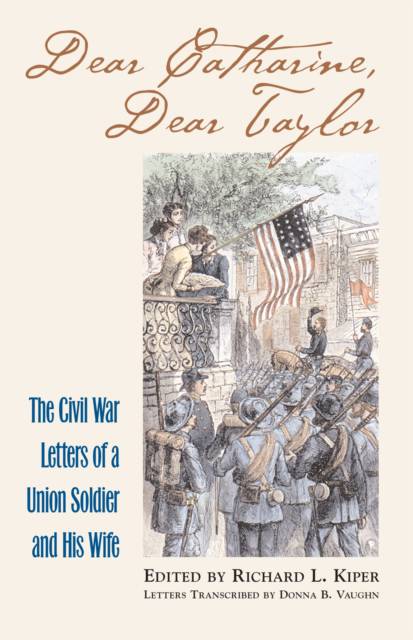
- Afhalen na 1 uur in een winkel met voorraad
- Gratis thuislevering in België vanaf € 30
- Ruim aanbod met 7 miljoen producten
- Afhalen na 1 uur in een winkel met voorraad
- Gratis thuislevering in België vanaf € 30
- Ruim aanbod met 7 miljoen producten
Zoeken
Dear Catharine, Dear Taylor
The Civil War Letters of a Union Soldier and his Wife
Catharine Peirce, Taylor Peirce
€ 44,95
+ 89 punten
Omschrijving
"I would like to take thee in my arms once more and have the little children around me. . . . But I know it is my duty to stay here and try and be one of the many that God has raised to put down this rebellion and blot out the institution of slavery."--Taylor Peirce "We hear so much good news of victories and all things are working well. Yet there is a sadness over it at last for there is so many wives and mothers left to mourn the loss of some brave son or husband in our late battles and I do not know but I am one of the number that may have to mourn for thee at this very time."--Catharine Peirce Taylor Peirce was 40 years old when he left his wife and family to enlist in the 22nd Iowa Volunteer Infantry Regiment. He served for three long years and saw action in both theaters of the Civil War-ranging thousands of miles from the siege of Vicksburg through engagements in Louisiana, Texas, Georgia, both Carolinas, and the Shenandoah Valley. During that time he saw his wife only twice on furlough, but still stayed in close contact with her through their intimate and dedicated exchange of letters. Both ardent Unionists who hated slavery and revered Lincoln, the Peirces wrote nearly every week over their long separation--letters that reveal a deep and abiding love for each other, as well as their strong--willed allegiance to the Union cause. Taylor's letters tell of battles and camp life, drilling and training, brave and cowardly commanders, troop morale, raucous amusements like music and gambling, delinquent paymasters, and his own moral code and motivation for fighting . They include graphic descriptions of the battles around Vicksburg, including vivid details about burning plantation houses, digging canals and trenches, and enduring constant rifle and artillery fire. Catharine, for her part, reported on family and relatives, the demands of being a single mother with three young children, business affairs, household concerns, weather and crops, events in Des Moines, and national politics, filling gaps in our knowledge of Northern life during the war. Most of all, her letters convey her frustration and aching loneliness in Taylor's absence, as well as her fears for his life, even as other women were becoming widowed by the war. While there are many collections of letters from Civil War soldiers to their wives, very few include such a rich trove of letters from the homefront. Together they paint an engrossing portrait of a soldier and husband who was trying to do his patriotic and familial duty, and of a wife trying to cope with loneliness and responsibility while longing for her husband's safe return. Beautifully edited and annotated by prize-winning Civil War historian Richard Kiper, they bring to life a nation under siege and provide a rare look at the war's impact on both the common soldier and his family.
Specificaties
Betrokkenen
- Auteur(s):
- Uitgeverij:
Inhoud
- Aantal bladzijden:
- 464
- Taal:
- Engels
- Reeks:
Eigenschappen
- Productcode (EAN):
- 9780700612055
- Verschijningsdatum:
- 14/11/2002
- Uitvoering:
- Hardcover
- Formaat:
- Genaaid
- Afmetingen:
- 158 mm x 250 mm
- Gewicht:
- 925 g

Alleen bij Standaard Boekhandel
+ 89 punten op je klantenkaart van Standaard Boekhandel
Beoordelingen
We publiceren alleen reviews die voldoen aan de voorwaarden voor reviews. Bekijk onze voorwaarden voor reviews.











